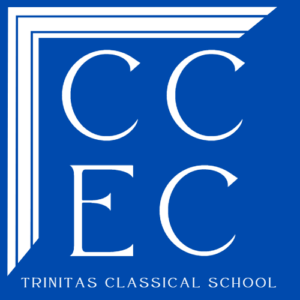 Trinitas recently hosted two annual highlights: Book Character Day and Thoughtful Reader Book Club. Each year, students and staff look forward to leaving their uniforms home and coming dressed like a favorite Biblical, historical, or book character. Last Wednesday was a delightful day for the likes of Fantastic Mr. Fox, Ebenezer Scrooge, Anne of Green Gables, King Arthur, and St. Paul to be greeted at the door by Principal Gandalf and to do their math lessons with Grandmother West Wind and Mrs. Piggle-Wiggle, literature with Athena and Laura Ingalls Wilder, Latin with the golden fleece, history with the Cat in the Hat, and logic with Tweedle Dee (or Dum, we’re not sure which). Students return home excited to read new books or re-read an old favorite. Some even begin planning next year’s costume.
Trinitas recently hosted two annual highlights: Book Character Day and Thoughtful Reader Book Club. Each year, students and staff look forward to leaving their uniforms home and coming dressed like a favorite Biblical, historical, or book character. Last Wednesday was a delightful day for the likes of Fantastic Mr. Fox, Ebenezer Scrooge, Anne of Green Gables, King Arthur, and St. Paul to be greeted at the door by Principal Gandalf and to do their math lessons with Grandmother West Wind and Mrs. Piggle-Wiggle, literature with Athena and Laura Ingalls Wilder, Latin with the golden fleece, history with the Cat in the Hat, and logic with Tweedle Dee (or Dum, we’re not sure which). Students return home excited to read new books or re-read an old favorite. Some even begin planning next year’s costume.
During Friday Focus time the previous week, we enjoyed activities and discussions related to our Thoughtful Reader Book Club selections. This year, our shared reading for the younger grades included fables by Aesop and Arnold Lobel. Students in grades 3/4 talked about how stories that feature animals and their particular characteristics (e.g., monkeys are inquisitive, beavers are industrious) can communicate truths about human strengths and weaknesses. The morals at the end of the fables continue to instruct over 2,000 years later!
The K-2 classrooms were abuzz with fable-inspired activities, like animal memory match, “Aesop [a.k.a Simon] says…creep like a wolf in sheep’s clothing,” and “Fractured Fables.” In the last of these, students tried to distinguish between true and false morals. See if you can discern the difference in the following list: A kindness is never wasted. Take what you want before others get it. The praise of men is worth earning. They complain most who suffer least. If you act powerful, you’ll become powerful. Slow and steady wins the race. Fine feathers do not make fine birds. Take credit for good deeds if you can. Cuddle with earth worms.
Students cast their votes by walking to the “false fable” side or “Aesop fable” side of the room. When the activity leader read, “Ugly people should be avoided,” one group was divided. At one point, a student heading toward the false fable side turned to the student who was in the middle considering the Aesop fable side and said: “Wait! So, if you were ugly, I should avoid you? That’s just not right!” Most of the students then joined her on the false side. “You can always trust beautiful people” was not as tricky for any of the groups. One student said, “I’ve read so many stories where that is not true.”
Students in grades 5-8 read C.S. Lewis’s The Magician’s Nephew. This was the second, third, or even fourth time reading the book for some of the students. As one who thought any good book is worth re-reading, Lewis would have been pleased! Students enthusiastically discussed the connections between MN and The Lion the Witch and the Wardrobe and whether it was better to read this back story before or after LWW. Students noticed parallels between the creation of Narnia through Aslan’s singing and the creation of our world through The Word in Genesis and John 1. Parallels were also drawn between the Witch’s temptation of Digory with the apple and the serpent’s temptation of Eve. We had fun talking about what music would go with what parts of creation: Celtic for the mountains one student immediately suggested, Norse for the seas, something high and fast for small animals, deep and slow for bigger ones. We laughed at several of Lewis’s humorous descriptions, including Uncle Andrew being “planted” by the newly-created animals of Narnia.
We also talked about the characters and philosophies of governance displayed by proud Uncle Andrew and wicked Queen Jadis, contrasting them with the humble cabby, Frank, first king of Narnia, crowned by Aslan himself. Students in grades 7/8 drew attention to King James and the idea of rule by “divine right” which occasioned reference to the importance of King John and the Magna Carta. We talked about the existence of real Nietzschean Ubermen (okay, I mentioned Nietzsche, but some of the students had already heard of him).
We also talked about how to see through the “fine” words of false philosophies like Digory did. After Polly disappears against her will as part of one of Uncle Andrew’s magic experiments, Uncle Andrew makes a speech in which he declares that promises should be kept and rules followed only by “little boys—and servants—and women—and even people in general,” but they “can’t possibly be expected to apply to profound students and great thinkers and sages…. Men like me,” he continues, “who possess hidden wisdom, are freed from common rules just as we are cut off from common pleasures. Ours, my boy, is a high and lonely destiny.” Uncle Andrew “sighed and looked so grave and noble and mysterious that for a second Digory really thought he was saying something rather fine.” But then, says Lewis, Digory “remembered the ugly look he had seen on his uncle’s face the moment before Polly had vanished: and all at once he saw through Uncle Andrew’s grand words. ‘All it means,’ he said to himself, ‘is that he thinks he can do anything he likes to get anything he wants.’” Lewis’s is a lesson worthy of Aesop: Very fine words may well conceal something utterly false.
And so is this: Playing with and talking about good stories makes thoughtful readers and deep thinkers.
© ALP
